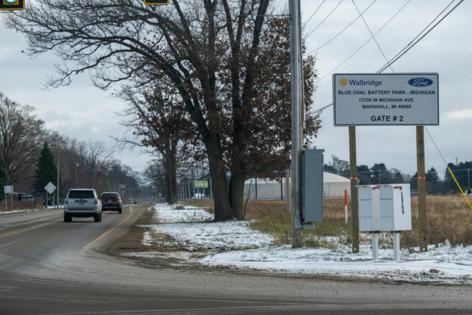Controversial Ford battery plant 'on track' to remain eligible for key federal support
Published in Business News
WASHINGTON — Ford Motor Co. confirmed Tuesday that its multibillion-dollar battery plant in south-central Michigan remains "on track" to qualify for a crucial federal tax credit, despite new federal restrictions on sourcing from China.
"Ford is committed to making the best, most cost-effective batteries for the next generation of electric vehicles in the United States," company spokesperson Robyn Jackson said in a statement. "BlueOval Battery Park Michigan is on track to qualify for the production tax credit — a win for our customers and a win for American competitiveness.”
The Marshall, Michigan, plant has been controversial because of Ford's agreement to license technology from Chinese battery giant Contemporary Amperex Technology Co. Ltd. at the new facility, an arrangement that sparked backlash and threatened business plans with some 60% of construction complete.
The new federal restrictions came via Republicans' One Big Beautiful Bill Act, a massive tax cut and spending package that President Donald Trump signed into law over the weekend. An earlier U.S. House version of the bill would have torpedoed Ford's eligibility for the federal Advanced Manufacturing Production Credit, but an all-out lobbying effort helped the Dearborn-based automaker secure favorable changes in the U.S. Senate.
The credit in question, also known as the 45X credit, targets battery producers and upstream industries. Battery cells, which store and release energy needed to power EVs, are each eligible for a credit of $35 per kilowatt-hour of energy they can store and $10 per kilowatt-hour for battery modules or pack assembly. The Marshall plant's capacity is 20 gigawatt-hours per year.
Ford's company statement uses careful language to describe its tax credit status, as the U.S. Department of the Treasury still needs to finalize implementation guidelines based on the congressional directive. Those guidelines will more firmly determine the plant's eligibility.
Ford CEO Jim Farley has called the credit "critical for our industry," but the House bill explicitly excluded components made as a product of licensing agreements with prohibited foreign entities — a designation that applies to CATL. The final Senate version removed that language.
Ford Executive Chairman Bill Ford originally said ineligibility of the production tax credit would “imperil” the $3 billion plant expected to create 1,700 jobs. Lisa Drake, Ford's vice president of technology platform programs and EV systems, later clarified that the automaker planned to “stick behind” Marshall, but said losing the credit could delay production and hiring.
The executives underscored that if EVs are going to be affordable, the company needs the advanced Chinese battery technology, and if it cannot build those cells economically in the United States, it will have to source from elsewhere.
Tesla Inc. has bought CATL’s lithium-iron-phosphate batteries made in China for U.S. EVs. Detroit-based General Motors Co. plans to do so, as well, until it can domestically produce lithium manganese-rich batteries, a technology Ford also is developing.
©2025 www.detroitnews.com. Visit at detroitnews.com. Distributed by Tribune Content Agency, LLC.












Comments